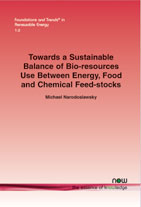Towards a Sustainable Balance of Bio-resources use Between Energy, Food and Chemical Feedstocks
By Michael Narodoslawsky, European Sustainable Energy Innovation Alliance (eseia), narodoslawsky@tugraz.at
Abstract
Bio-resources are becoming increasingly contested as the demand for food grows. There is also a pressure to provide energy and materials from them. This monograph discusses the current flows of bio-resources, their inherent properties and the services that these resources could provide in a sustainable bio-based economy.
There are two possible pathways that could convert solar radiation — which would be seen as our planet's natural income — into material goods and storable energy carriers. This would be using electricity to generate hydrogen via electrolysis and convert it with CO2 into hydrocarbons or utilizing bio-resources. Most uses of bio-resources compete for limited fertile land, requiring the highest possible efficiency in their use. Natural endowment of land, logistical requirements as well as economic and cultural factors in their utilization make bio-resources inherently contextual goods. Decisions about the rational use of bio-resources must therefore be taken into account with regard to concrete regional contexts.
Based on the analysis of services of bio-resources in a bio-based economy, their particular properties and the characteristics of current state technologies, this monograph develops rules to balance the utilization of bio-resources in the framework of regional context.
Towards a Sustainable Balance of Bio-resources use Between Energy, Food and Chemical Feedstocks
Bio-resources are becoming increasingly important and topical as the world is faced with growing food demand as well as increased pressure to provide energy and materials. This monograph discusses the current flows of bio-resources, their inherent properties and the services that these resources may provide in a sustainable bio-based economy.
There are two possible pathways to converting solar radiation, which we can regard as our planet's natural income, into material goods and storable energy carriers: using electricity to generate hydrogen via electrolysis and converting it with CO2 into hydrocarbons, or utilising bioresources. Most uses of bio-resources compete for limited fertile land, requiring the highest possible efficiency in its use. The natural endowment of land, logistical requirements and economic and cultural factors in their utilisation make bio-resources inherently contextual goods. Decisions about the rational use of bio-resources must therefore be taken with regard to concrete regional contexts.
Based on an analysis of services of bio-resources in a bio-based economy, their particular properties, and the characteristics of current state technologies, this monograph develops rules to balance the utilisation of bio-resources in the framework of a regional context.
